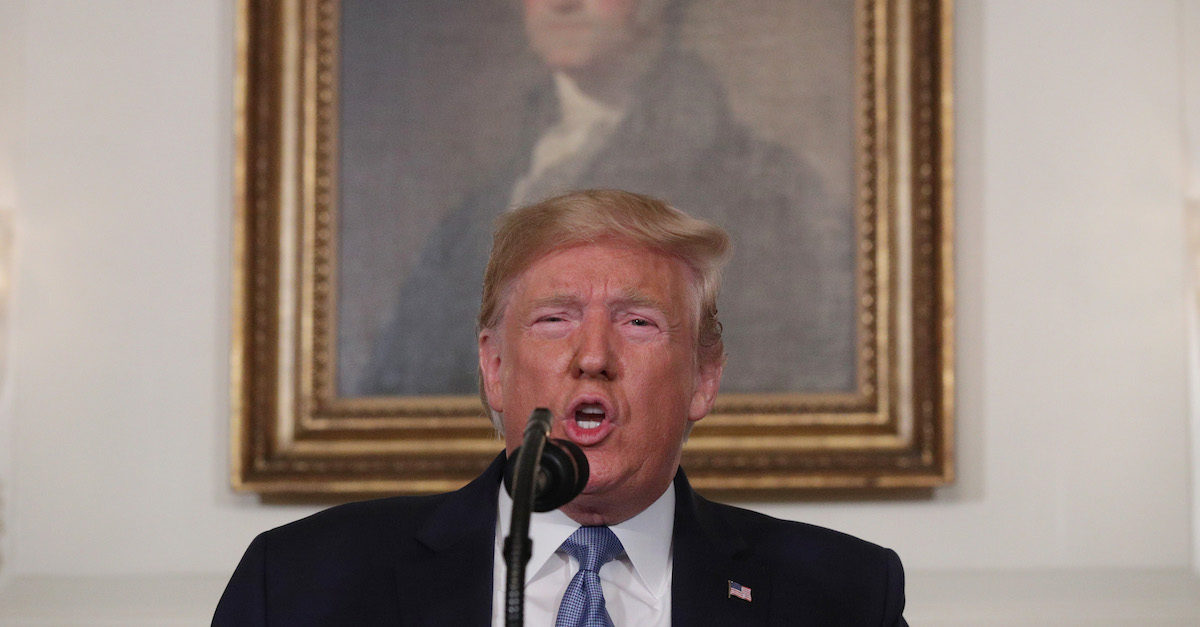
In response to reports that President Donald Trump repeatedly pressured Ukrainian President Volodymyr Zelensky to investigate Hunter Biden, the President and his defenders have been quick to point out that there was never a mention of any kind of “quid pro quo” bribery deal. According to Trump and his personal attorney Rudy Giuliani, despite reportedly urging Zelensky to initiate the inquiry eight times in one conversation, the lack an explicit tit-for-tat proposition rendered the entire interaction innocuous.
“No quid pro quo – there was nothing,” Trump told reporters on the South Lawn of the White House Sunday morning, adding, “It was a perfect conversation.”
Giuliani on Saturday provided a similar line of defense.
“Whistleblower story, like [Brett] Kavanaugh story, is blowing up. Now no mention of money or quid pro quo. So appropriate conduct. Now we must look at Biden Family pattern of corruption of selling his public offices for 5 decades. Pattern of corruption enabled by Swamp,” he tweeted.
But several legal experts have noted that as President, Trump doesn’t need to expressly engage in an unlawful scheme to bribe or extort the head of a foreign government for such conduct to be an abuse of presidential power.
Former federal prosecutor Renato Mariotti on Sunday wrote that the allegations against Trump are so egregious they transcend the thresholds of standard criminal statutes.
“If what Trump is accused of doing is true, it is a kind of corrupt conduct that the criminal system is not equipped to handle,” he wrote in an op-ed for Politico.
“What Trump is alleged to have done is not a garden variety crime; it’s worse. It involved misusing $250 million in aid appropriated by Congress for his benefit—the kind of gross misconduct that easily clears the bar of high crimes and misdemeanors set by the Constitution when impeaching a president. Which means the best way to hold Trump accountable for that misconduct isn’t a criminal trial; it’s for Congress to impeach him.”
Vermont Law School professor Jennifer Taub noted that Trump and Giuliani’s actions may have run afoul of at least one criminal statute.
According to Professor Taub, the anti-gratuity part of bribery statute 201(c)(1)(B) punishes gifts and other things of personal value given to federal officials as a “thank you” for a specific official actions.
“In other words, there does not need to be any kind of agreement. However, there does need to be a nexus between the gift and the official act,” she wrote via email.
“Therefore, if after releasing funds to Ukraine, the Ukranian president began or continued to provide dirt on Trump’s political opponent to him, that in and of itself would violate the anti-gratuity statute. In addition, conversations with Giuliani plotting this out seem like conspiracy to violate the statute, it’s own offense.”
Similarly, Harvard Law professor and author of the book “To End a Presidency: The Power of Impeachment,” Laurence Tribe pointed out that Trump’s alleged actions unequivocally constitute a violation of his oath of office.
“If Trump was pressing Ukraine to go after Biden’s family at the same time that Trump was withholding aid from Ukraine to defend itself from Russian aggression, that’s enough,” Tribe tweeted Sunday. “No explicit quid pro quo is needed to make this a betrayal of his oath and a ‘High Crime and Misdemeanor.’”
In an email to Law&Crime, Tribe further explained why the President’s alleged conduct is impeachable.
“There would’ve been little point in the Framers’ decision to include ‘Treason’ and ‘Bribery’ as separate from ‘High Crimes and Misdemeanors’ if the sort of abuse the President appears to have engaged in here couldn’t be deemed impeachable even if it fell into the latter category unless it also fell into the former,” Tribe wrote.
[image via Alex Wong/Getty Images]